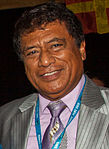| |||||||||||||||||||||||||||||||
17 of the 26 seats in the Legislative Assembly | |||||||||||||||||||||||||||||||
|---|---|---|---|---|---|---|---|---|---|---|---|---|---|---|---|---|---|---|---|---|---|---|---|---|---|---|---|---|---|---|---|
| |||||||||||||||||||||||||||||||
 Results by constituency | |||||||||||||||||||||||||||||||
| |||||||||||||||||||||||||||||||
Early general elections under a new electoral law were held in Tonga on 25 November 2010.[2] They determined the composition of the 2010 Tongan Legislative Assembly.
The early elections were announced by the new King George Tupou V in July 2008 shortly before being crowned on 1 August 2008,[3][4] and were preceded by a programme of constitutional reform.[5] For the first time, a majority of the seats (17 out of 26) in the Tongan parliament were elected by universal suffrage, with the remaining nine seats being reserved for members of Tonga's nobility. This marked a major progression away from the 165-year rule of the monarchy towards a fully representative democracy.[6] The Taimi Media Network described it as "Tonga’s first democratically elected Parliament".[7]
The Democratic Party of the Friendly Islands, founded in September 2010 specifically to fight the election and led by veteran pro-democracy campaigner 'Akilisi Pohiva, secured the largest number of seats, with 12 out of the seventeen "people's representative" seats.[8]
- ^ Includes nobles and peer members who were appointed by the King of Tonga.
- ^ "Civics education vital ahead of Tonga election, says advocate". Radio New Zealand International. 21 April 2010. Retrieved 22 April 2010.
- ^ "Tonga's king to cede key powers". BBC. 29 July 2008. Retrieved 22 April 2010.
- ^ "His Majesty King George Tupou V- A Monarch for a time of change". Fiji Daily Post. 28 July 2008. Archived from the original on 2 February 2014. Retrieved 22 April 2010.
- ^ "Commission pessimistic over ability of Assembly to meet 2010 election deadline". Matangi Tonga. 12 November 2009. Archived from the original on 5 May 2010. Retrieved 22 April 2010.
- ^ "Strong showing for Tonga democrats in election". BBC News. British Broadcasting Corporation. 26 November 2010. Retrieved 26 November 2010.
- ^ "Absence of PM from opening of Parliament questioned" Archived 16 March 2012 at the Wayback Machine, Taimi Media Network, 9 June 2011
- ^ Malkin, Bonnie (27 November 2010). "King prepares to hand over powers after election in Tonga". Sydney Morning Herald. Fairfax Media. Retrieved 26 November 2010.

